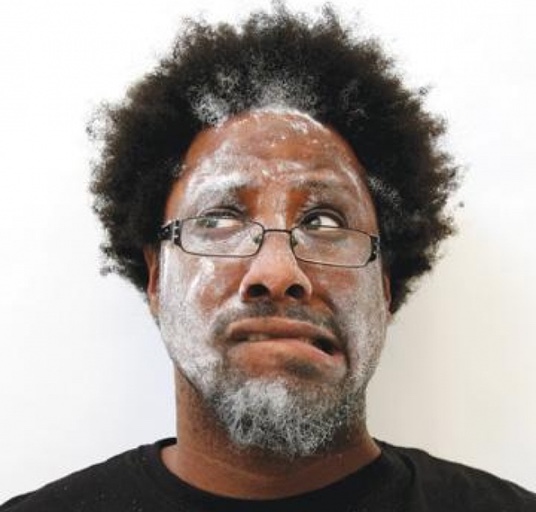
Kamau Bell labels himself a sociopolitical comedian. His new show, United Shades of America, premiered April 24 on CNN. Bell says that the show tells the story of a black man who goes where black people should not go, so the viewer clearly anticipates some nontraditional, iconoclastic antics by Bell as he journeys through some unusual venues and turns these sojourns into comedy.
Promotional ads for the show feature an aging VW van loaded with a multicultural/eclectic group of passengers emerging from the vehicle as “Why Can’t We All Be Friends” plays in the background. To that point, the gimmick is moderately funny until the camera pans to the back seat where the viewer finds several hooded members of the Ku Klux Klan — delivering the subliminal message that all the passengers will eventually get together and sing Kumbaya.
Bell launches into his theme with a vengeance in episode one by devoting the entire hour to interviewing current members of the Klan. As he schmoozes up to various grand wizards and dragons around the South, Bell tries to interject humor into a topic that is about as far from being funny as the North Pole is from the South Pole. His unctuous attempts to endear himself to people who blatantly avow that blacks are inferior, Jews are “dirty” people who should not be in America, and America should be a white man’s country, comes across as disgustingly sycophantic and borders on Uncle Tom-ism in its lowest form. When one speaker opined that the biggest sin — the most egregious act of all — was intermarriage of the races, Bell joked it off, admitting that he was married to a white woman, and continues the conversation.
Bell so endeared himself to the Klan that he was invited to their most sacred ritual — a cross burning — that he gleefully watched as he raised such inane questions as the type of wood used in construction of Klan’s signature calling card. While generally answering his questions, Bell’s newfound friends in the Klan didn’t offer him a robe or membership. But he might as well have donned his own sheet as he continued to yuck it up and laughed about the technicalities of cross burning — something that generations of victims of this terrorizing act would hardly find comic.
I readily admit that I have a generation gap with the 40-year-old Bell. I also admit to having an educational (or more politely an information gap) with him when it comes to the history of the KKK. Apparently Bell, who dropped out of college to pursue his career as a comedian, never took any classes in American history or African-American history that discussed the history and brutality of the KKK.
First established in 1865 or 1866, depending on your source, the KKK was founded by Nathan Bedford Forrest, who became the first Grand Wizard of the Klan. A former Confederate Army officer, Forest can be remembered as the man who commanded the troops that massacred helpless black soldiers at Fort Pillow. In post-Civil War America, the Klan terrorized black citizens with lynchings, cross burnings and just about every other form of mayhem and terrorism available. Sins by blacks that incurred the Klan’s wrath were such things as attempting to vote; getting an education; engaging in business; speaking to a white woman — ala Emmett Till — or just about anything that the Klan found objectionable, no matter how trivial.
Accounts of the numbers of people lynched and killed by the Klan vary, but by every credible source the numbers reach into the thousands since its inception. A study by Tuskegee Institute asserts that 1500 people were killed by the Klan between 1865 and 1877 alone. Lynchings attributed to the Klan continued with a vengeance to the end of the 19th century and well into the 20th century accounting for untold misery and deaths.
The Klan was reincarnated in the 1920s and again in 1940s with the rise of the Civil Rights Movement. You can see the handiwork of the modern-day Klan in the death of the three civil rights works, Michael Schwerner, Andrew Goodman and James Chaney, who were killed in 1964 in Meridian, Mississippi; in the gunning down of Medgar Evers; the killing of the four schoolgirls in the bombing of the church in Birmingham, Alabama, and hosts of other acts of violence.
A legitimate investigative interview is one thing. But Bell’s attempt to make a comedy out of conversations with current and active Klan members — not descendants or former members — is just not funny in my book. Many of the Klansmen that Bell shuffled up to were easily old enough to have been a part of the violence of the last several decades, which is probably the reason that all but one of the members kept their hoods on, and many had their voices altered.
Maybe for his next performance Bell can go to Germany and yuck it up with some old Nazis as he strolls around Auschwitz and engages in mindless banter about how they gassed up the ovens and gas chambers.
While I commend Bell on this second episode where he visited San Quentin and depicted another side of prison life and culture, I find his attempt to draw humor out of the KKK disgusting. Clearly he has gone where no black man should go or want to go. Finding humor in an organization that has a history of violence and hatred is not something that I just can’t find humorous. Bell may strike a chord with some viewers, but in my book, there can be no melodious note with the KKK — no matter how you strike it.

C. Ellen Connally is a retired judge of the Cleveland Municipal Court. From 2010 to 2014 she served as the President of the Cuyahoga County Council. An avid reader and student of American history, she serves on the Board of the Ohio History Connection and was recently appointed to the Soldiers and Sailors Monument Commission. She holds degrees from BGSU, CSU and is all but dissertation for a PhD from the University of Akron.
3 Responses to “Finding Humor with the KKK Doesn’t Ring a Bell by C. Ellen Connally”
Peter Lawson Jones
Excellent commentary, Judge Connally. Although I did not see the subject episode, if it was as you describe, Mr. Bell’s acts of ingratiation are, viewed in the best light, incredibly nauseating. (I concur with your sunnier assessment of his San Quentin episode). You may wish to see the documentary, “Accidental Courtesy,” which screened at the recent Cleveland International Film Festival. In the documentary, an African-American musician/teacher travels the South meeting with KKK members in a retail, one-on-one effort to befriend them and change their perspective on race. Many of them abandon their affiliation with the Klan and gift him with their robes and hoods. Would be very interested in your reaction to the documentary.
Kay Lenear
I don’t believe I would have found Mr. Bell’s comedic act funny either. I didn’t see it on CNN.
Everett Prewitt
I agree, Judge Connally. Skinnin’ and grinnin’ with those who even identify with the Klan disrespects everything our ancestors ever fought for.